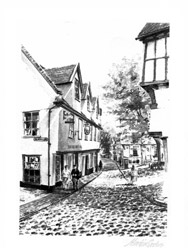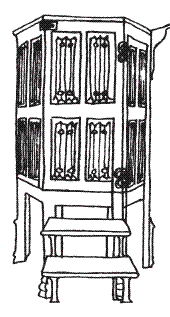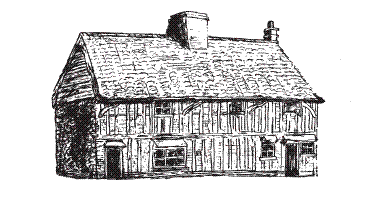Bilney Day in Norfolk
Report by Valerie Offord
June 2004
 |
| A street in Norwich |
This spring Mary Clow and
Michael Hammond resumed their
successful collaboration of the previous
year by organising another
spring day conference for Tyndalians
and their friends in Norfolk.
This year’s theme was Thomas
Bilney (1495-1531), Protestant
martyr and contemporary of William
Tyndale, who was born and
bred in Norfolk, studied and
preached in Cambridge and was
condemned and burned to death
in Norwich – an East Anglian to
the hilt!
On the morning of Saturday 24
April, a glorious spring day, a group
of us met the London train at Norwich
station and set off by mini
bus into the depths of the Norfolk
countryside for East Bilney, the first
destination of the day-long programme.
Slightly later than anticipated,
after a companionable drive
through the county’s endless narrow
lanes, our small party arrived at St
Mary’s Parish Church to be greeted
by a band of intrepid map-literate
car drivers and local residents.
Thomas was born and grew up
in East Bilney and then moved to
Cambridge for higher education.
The house where he and his family
lived now known as ‘The Martyr’s
Cottage’ is still there in the tiny village
– now sympathetically restored
by its current owner, an enthusiastic
historian.
 |
| Latimer’s pulpit c.1510 in the Church of St. Edward King and Martyr, Cambridge from which Hugh Latimer and Thomas Bilney preached. |
After a welcome coffee break we modern-day pilgrims settled down in the pews to listen to an enthusiastic account of the history of East Bilney Church and its restorations by John Crick, the churchwarden. Many of us remained sceptical about his account of Bilney’s ashes being accidentally discovered when digging a grave in the churchyard. However, we were able to admire the two panels of the stained glass window made by Shrigley and Hunt in 1886: the first depicted the 16th century martyr expounding on a new translation of the Bible and the second showed him bound in chains with red flames curling round him and Norwich Cathedral in the background.
Our convoy, maps at the ready or simply armed with blind faith and a herdlike instinct, then set off again arriving miraculously intact at Waterfall House, Swanton Morley, to be warmly greeted by the friendly and hospitable Diggle family who had prepared an aperitif followed by a sumptuous lunch for all of us. This was no mean achievement since the number of participants seemed a little uncertain!
 |
| The Martyr's Cottage, East Bilney where Thomas Bilney was born in 1495 |
The after lunch lecture by Dr Korey Maas, St Cross College, Oxford, was a triumph – a wonderful lunch is a hard act to follow. The lecturer’s fascinating paper, entitled Thomas Bilney: ‘simple good soul’? (printed in full in this issue of the Journal) was delivered in such a professional manner that the entire audience was enthralled, wide-awake and thoroughly informed. To attend a lecture about a person when one is literally treading the same soil he trod some 500 years previously makes the whole subject so immediate, so relevant.
It was with great reluctance that we broke off our post lecture discussions in the idyllic mill garden and took leave of its owners to continue on our way. Those who went on to Norwich for a guided walking tour of the Bilney sites in that city led by Michael Hammond saw the Guildhall where he was tried and the dungeon where he was imprisoned, and ambled through the mediaeval streets of Norwich past the Cathedral to the Lollard’s pit set in a low amphitheatre beyond the Bishop’s Gate beside the river Wensum. It was here within sight of the Cathedral that Bilney was burnt on Saturday 19 August 1531.
In all it was a very informative day – a living history day - spent in agreeable, lively company. My one small regret was that so few Tyndale members availed themselves of the opportunity to come to Norfolk to discover the story of a brave man who died for his beliefs. I should like to take this opportunity to extend thanks on behalf of the participants to those who devoted so much time and effort into bringing off a great logistical feat by organising this event.